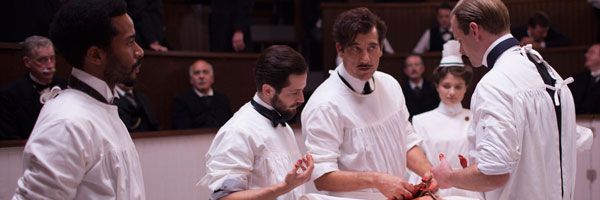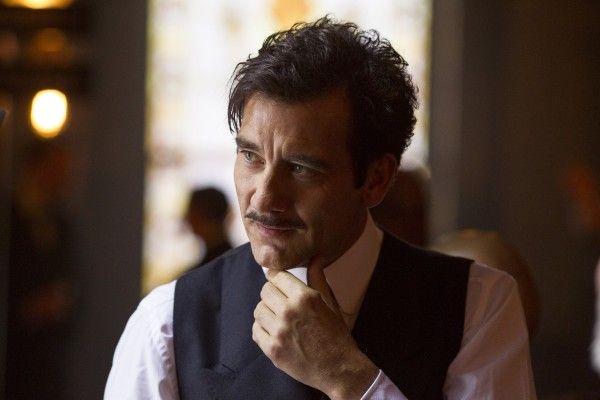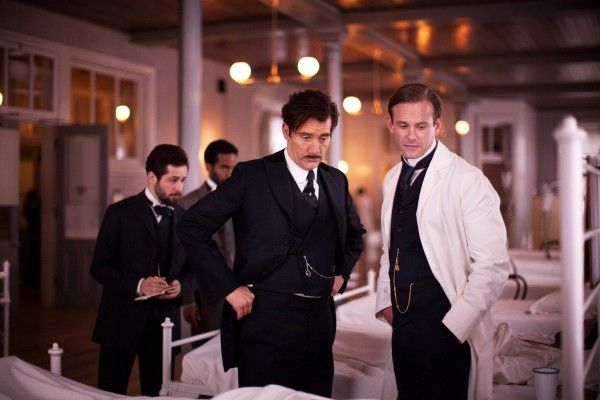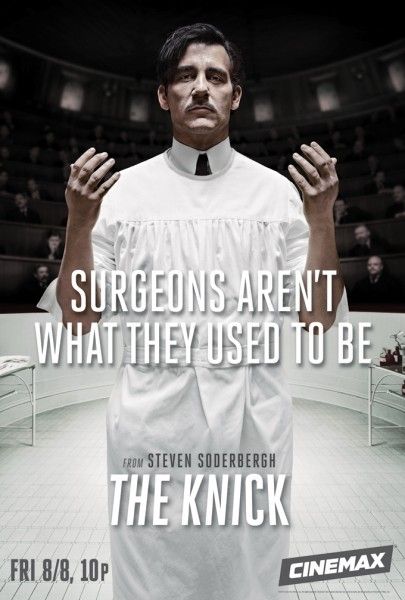Nothing exemplified The Knick's tangled web more than the scene early in the hour that showed each of the main characters arriving at the hospital. In Steven Soderbergh's long tracking shot, the timing and fluidity were perfect, like the methods by which each was shown (Nurse Elkins on a bicycle, Thackery and Cornelia in coaches, Algernon on foot, and the young doctors Everett and Bertram finishing up a smoke before heading inside). One of The Knick's most distinctive parts is its distinctive look: the blood is all the more stark against such a sterile, antique background. Hit the jump for why "I have a lead on a failing heart at Blackwell Island. With any luck, he won't survive the week."
The thing that sets The Knick apart from most other series is that it will have the same writers and the same director throughout its run (at least, throughout its first season). Like True Detective, it gives the production a unified look and tone that defines the series even more than its story. The Knick is essentially a medical procedural with that all-too-familiar maverick doctor, battling his own demons (although Clive Owen is fantastic here), and it takes place in an era that TV has recently been obsessed with. But the singularity of its vision, and the way that it is crafted (like the lack of almost any non-diegetic sound or music; and when there is, it's modern and minimal), make it something special.
Another thing that makes The Knick stand out among its Gilded Age counterparts, or really any historical drama, is that its primary minority character, Algernon, does not just have a story as a foil for his white companions, or act as a one-man civil rights movement. But he does not let the setbacks slow him down. By the end of the episode, he had put together his own clinic in the basement (near the pigs …), and started building up his own clientele. He also proved his additional skills by laying flat his ornery neighbor, and then leaving out the items necessary to help him start his healing. BOSS MOVE.
The Knick is also slowly building up its very complex world by giving time to almost every main character, even to the exclusion of Thackery (which is a good thing -- Thackery is the anchor, but he doesn't have to be the primary focus in every event). "Mr. Paris Shoes" gave some nice background on characters like Cornelia, and how she became her father's proxy, as well as the aforementioned Algernon, and Barrow, who seems to be putting himself on the line both personally and professional when it comes to the hospital's finances (and lost a tooth for his troubles).
Cleary the ambulance driver is the show's best comic relief, with his assertion that a body isn't dead unless it's been checked by a doctor, along with his other quips and bar fights, and his knowledge of how to break into other hospitals (as well as his fascination with gigantism and elephantiasis). Like most of The Knick's characters, he flows in and out among different stories, having a moment here, a quip there. But he overlapped in a more serious way at the end of the hour, when he follow the nun (sans habit) to an apartment where, we learn, she performs moonlight abortions.
I would be remiss not to mention the Case of the Week, though, which The Knick does almost everything it can to hide when it comes to its procedural nature (and I respect the heck out of it). Each case, so far, has had a lot of bearing on the rest of the plot -- it's not just about blood and gore and rudimentary medical procedures (or, at this point, any miracles). The first patient in "Mr. Paris Shoes" highlighted the electricity problems in the hospital, and the second showed Everett having a hard time dealing with a patient bleeding out because he could not connect the aortic tissue back. His fellow surgeons reassure him, but there were echoes of Thackery's words to Christiansen's widow about dealing with what they do. Christiansen found his way out, and Thackery has his own. Everett is also battling against the pressure of competing with Algernon, who he believes took his place in the hierarchy.
Despite these swirling plots, so much of The Knick is quiet, without dialogue, and yet so much is conveyed in its every hour. It's an entrancing series.
Episode Rating: A
Musings and Miscellanea:
-- Flashbacks are tricky, but using the photo as a reference made it less awkward, and without the need for special "memory" lighting or anything. It just played out like a normal scene. Bravo.
-- "I know where Paris is, nigga!" - Algernon's troublesome neighbor.
-- And Typhoid fever is now among us! A Typhoid Mary reference is sure to come.
-- "I expect these things. You're upset because you don't" - Algernon.
-- Algernon's advice to Bertie and his friend about the dance halls was hilarious (and true). He's definitely my favorite character so far.
-- I do like that he learned something from Thackery though, too -- cocaine!
-- The period pieces and attention to detail are exquisite.
-- Everett's baby may be the cutest baby I've ever seen.
-- I'm digging the music in this series.
-- "We've been waiting all week for that crane to go, and went it did go, ohhh, a holy show if I've ever seen" - Tom Cleary, of County Cork.
-- "I have a lead on a failing heart at Blackwell island. With any luck, he won't survive the week." - Barrow, attempting to procure bodies for Thackery and his team to practice on.
-- "No flame needed." "But does it make toast?" - regarding the new electricity. I adored the buzzing and the irritation of it, interrupting scenes, etc. Thackery smashing the box was also a great moment, especially because of how Barrow slid into the room when he started.
-- "If electricity is to show our modernity, then killing a nurse and setting a patient on fire is not the best way to convey that" - Thackery. Hands up, who would have forgotten in the moment and electrocuted themselves with a bucket of water? You know it would be close!




